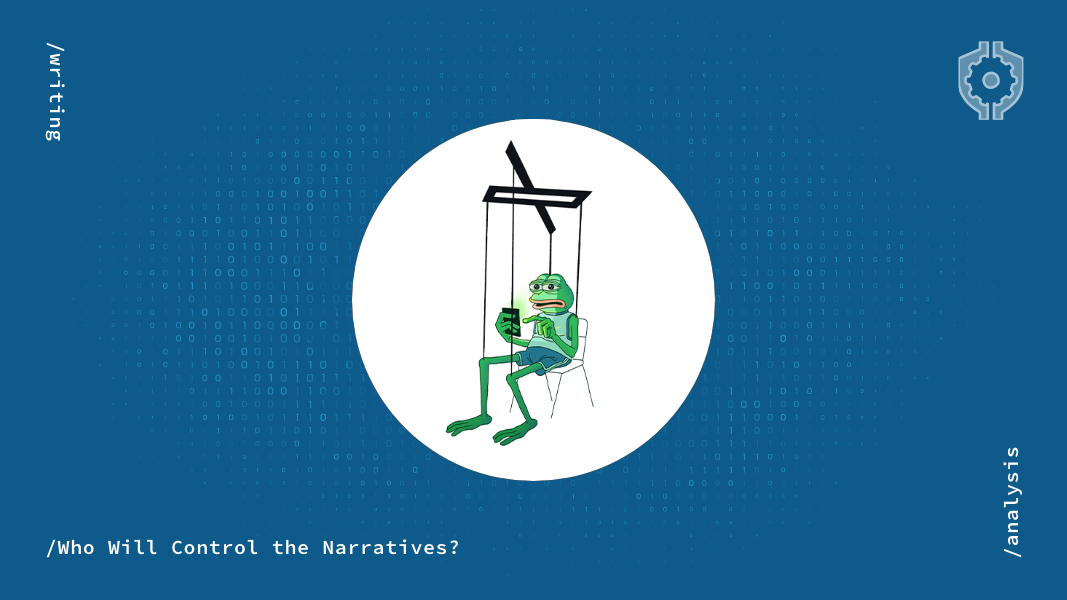Who Will Control the Narratives?
Is X a wolf in sheep's clothing? It has re-positioned itself as a home for contrarian thinkers but ultimately retains centralized control. Distributed social communities are now turning the tables.

Freedom and privacy advocates have been long aware of the growing state influence over news organizations and social media.
It wasn’t until Covid that the issue caught the attention of a significant portion of the world population.
The once-moderate “extremes” were silenced, along with experts spreading “mal-information”, as determined by the intent, not content.
But then there was pushback. Trust in public institutions plummeted, Elon purchased Twitter, promising increased transparency and autonomy with the publishing of the Twitter Files, and despite the continued political divide it feels safer posting controversial takes on the internet.
Borrowed Time
While things may look better temporarily in terms of deplatforming, Twitter users have started to realize that they are effectively shadow banned without getting a blue checkmark as their content and reputation is demoted.
What’s the big issue? Paying with a credit card de-anonymizes users. And while this may not be an issue under a relatively free speech regime, if the tables turn then governments will be able to threaten much greater consequences when you are perceived to have spoken out of line.
What we saw in small doses with Canadian protester bank accounts being suspended could be just the beginning.
Big Contradiction?
Elon’s Twitter “aspires to be the best (or least bad) source of truth on the Internet”.
The success of Community Notes speaks greatly to improvements in decentralizing fact checking. As this develops, I wouldn’t bet against Twitter achieving (or sustaining) this goal for some time.
However, with X’s mission of also becoming like WeChat as the “everything app”, people should start to get concerned.
While Community Notes decentralizes fact checking when working as intended, Twitter still retains ultimate control over what gets fact checked, what doesn’t, and what simply disappears.
Similarly, Twitter has begun sharing revenue with creators, but will this just end up being one more tool to control the narrative like eventually happened with Youtube?
So to sum things up, Twitter seeks to hold ultimate power over not only the de-anonymized social graph but also over payment rails, long-form content distribution, and so on. And, at the same time, they hope that this power doesn’t corrupt.
Let’s just hope that the digital justice system doesn’t then follow suit like with WeChat.
Best Time to Build
As social giants integrate with fiat payment rails and experiment with how to manage disinformation and AI-generated content, new experiments focused on the distribution of power are growing and mutating quickly.
Censorship resistant alternatives like Nostr emerged from the information chaos and users already benefit from more control in customizing content serving algorithms.
IPFS and Arweave are gaining traction.
Platforms like Keet and Simplex are redefining private communications.
Creators are even publishing directly to Bitcoin.
We’re seeing social and communication platforms experiment with new models built on microtransactions, paywalls and subscriptions, crowdfunding, digital art collections, and much more.
A new wave of privacy and autonomy-preserving platforms are already being built.
What More Do We Need?
So with these new microblogging platforms already offering a similar experience to big social, but with increased user ownership and control, is the mainstream about to jump in on the fun? Unlikely.
However, if these alternative platforms can offer not just a similar but a better value proposition than big social, there may be a decent chance of distributing the immense power that has accrued to Big Tech.
And I believe we are already seeing better value propositions emerge!
Bluesky and Primal (a Nostr client) allow users to subscribe to custom feeds. I believe that this is a feature that could potentially increase content relevancy by an order of magnitude, and if so, could be a big driver of success.
Reputation is another greatly unsolved challenge with social media. We’re starting to see rapid experimentation with platforms like DeBank's Stream implementing trust and credibility scores for content, along with TVF (“Total Value of Followers”) in an attempt to provide a better reputation system for the DeFi trading community.
Some Nostr clients are only supporting zaps (Bitcoin Lightning Network tips) in place of likes as a way of giving monetary value to upvotes.
Zero knowledge proofs offer a way to mint badges/certificates that prove participation, on-chain actions (see Sismo), and verify third party attestations (see PolygonID) while preserving privacy.
As AI-generated content proliferates and Big Social attempts to combat it with paid plans and other privacy-reducing features, these features may find a product market fit where Big Social can’t.
This is an exciting time and I expect a lot of turbulence and shake-ups! And hopefully when the dust settles, content creators and end users will share greater ownership and privacy.
